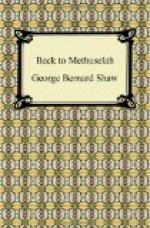ZOO. Yet you would be much more conscious of him, would you not?
THE ELDERLY GENTLEMAN. I should not allow that to commit me to any familiarity with the fellow. I have been twice at the Summer Sports at the South Pole; and this man pretended he had been to the North Pole, which can hardly be said to exist, as it is in the middle of the sea. He declared he had hung his hat on it.
ZOO [laughing] He knew that travellers are amusing only when they are telling lies. Perhaps if you looked at that man through a microscope you would find some good in him.
THE ELDERLY GENTLEMAN. I do not want to find any good in him. Besides, madam, what you have just said encourages me to utter an opinion of mine which is so advanced! so intellectually daring! that I have never ventured to confess to it before, lest I should be imprisoned for blasphemy, or even burnt alive.
ZOO. Indeed! What opinion is that?
THE ELDERLY GENTLEMAN [after looking cautiously round] I do not approve of microscopes. I never have.
ZOO. You call that advanced! Oh, Daddy, that is pure obscurantism.
THE ELDERLY GENTLEMAN. Call it so if you will, madam; but I maintain that it is dangerous to shew too much to people who do not know what they are looking at. I think that a man who is sane as long as he looks at the world through his own eyes is very likely to become a dangerous madman if he takes to looking at the world through telescopes and microscopes. Even when he is telling fairy stories about giants and dwarfs, the giants had better not be too big nor the dwarfs too small and too malicious. Before the microscope came, our fairy stories only made the children’s flesh creep pleasantly, and did not frighten grown-up persons at all. But the microscope men terrified themselves and everyone else out of their wits with the invisible monsters they saw: poor harmless little things that die at the touch of a ray of sunshine, and are themselves the victims of all the diseases they are supposed to produce! Whatever the scientific people may say, imagination without microscopes was kindly and often courageous, because it worked on things of which it had some real knowledge. But imagination with microscopes, working on a terrifying spectacle of millions of grotesque creatures of whose nature it had no knowledge, became a cruel, terror-stricken, persecuting delirium. Are you aware, madam, that a general massacre of men of science took place in the twenty-first century of the pseudo-Christian era, when all their laboratories were demolished, and all their apparatus destroyed?




